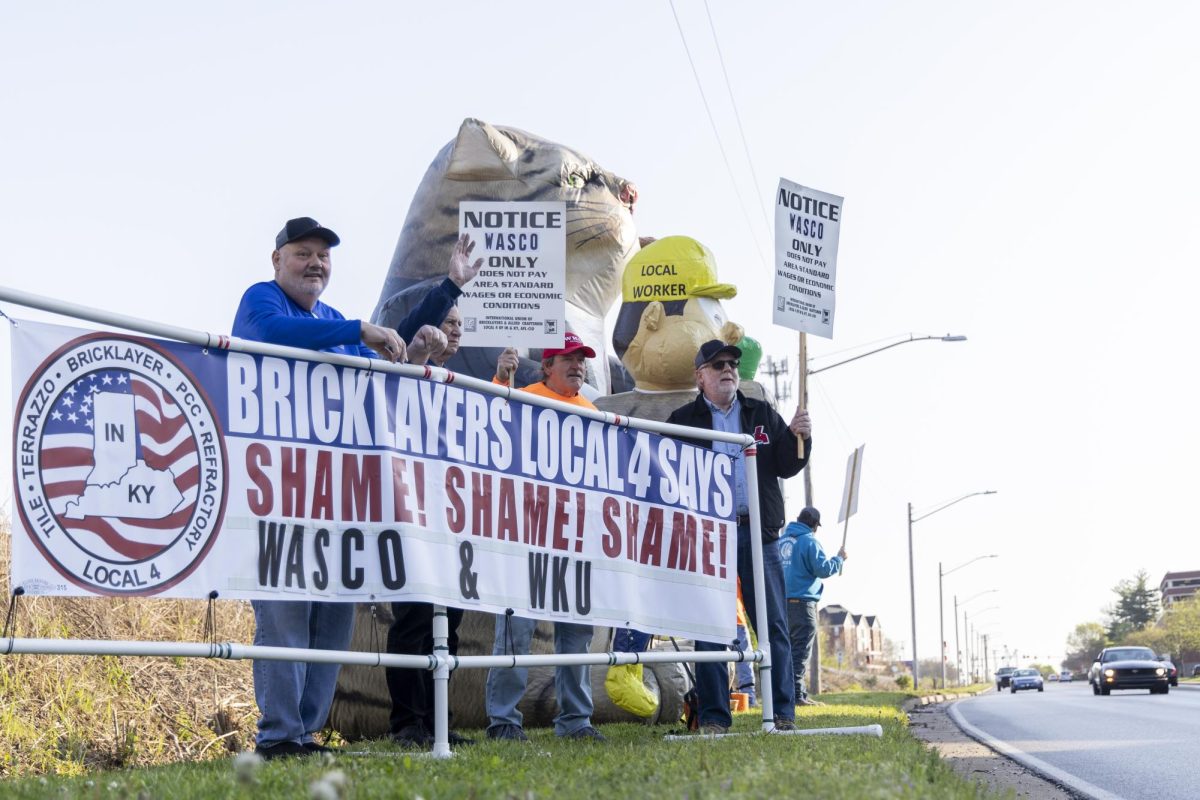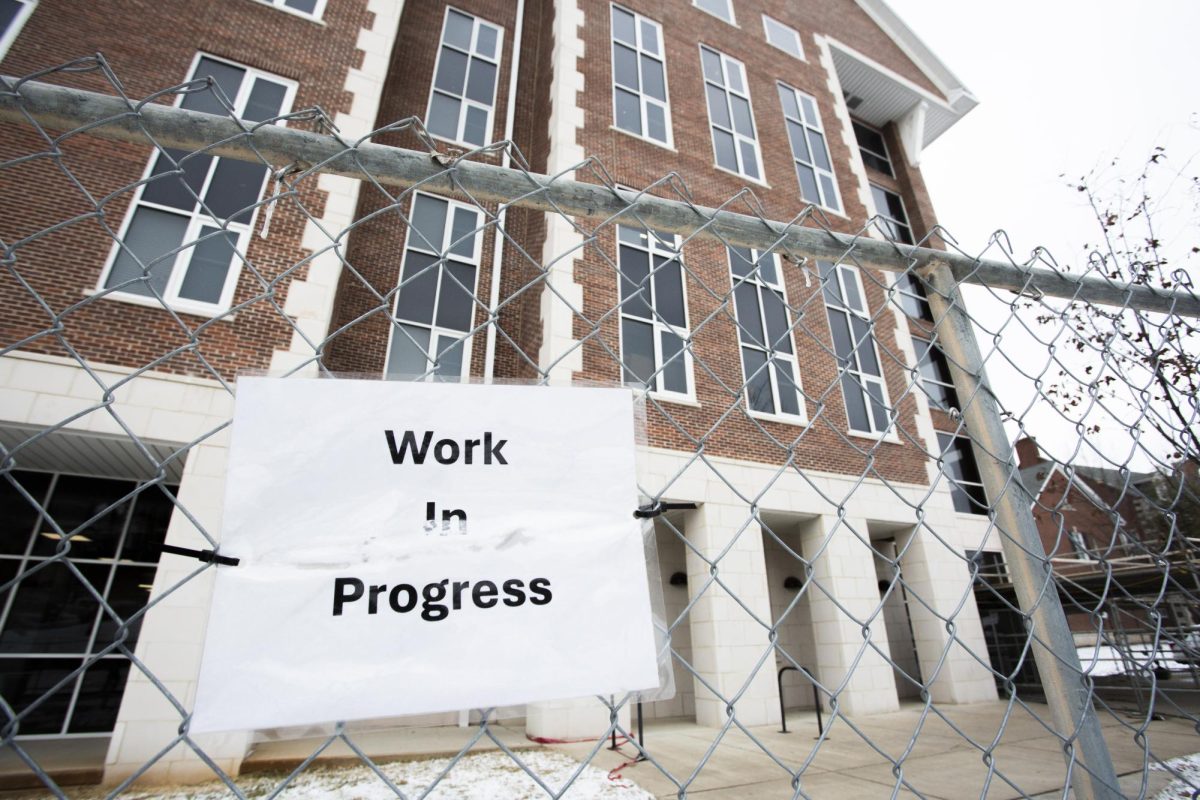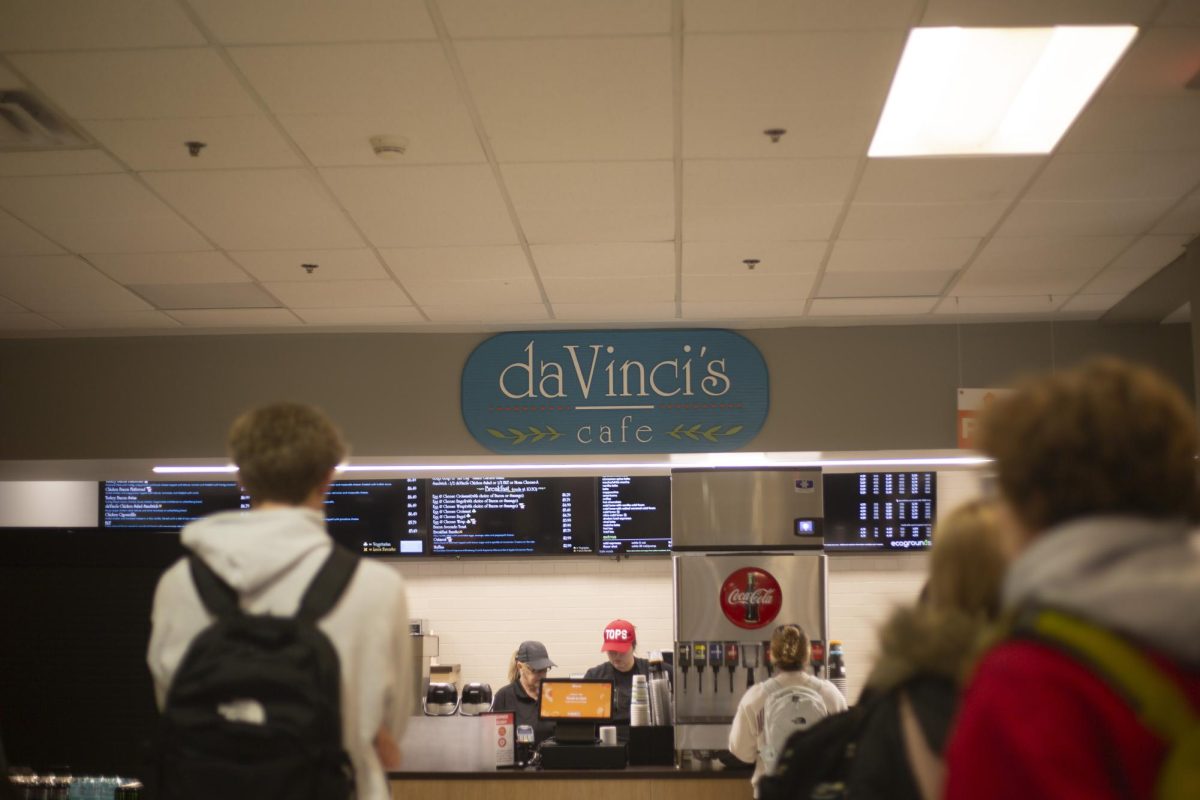Union workers circled a roughly 15-foot-tall inflatable “fat cat,” which sported a pinstripe suit and smoked a cigar while wadding through a stack of cash in one hand and gripping a construction worker by the neck in the other.
They rallied against WASCO, a subcontractor for the Hilltopper Fieldhouse construction project, citing the company as failing to meet area standard labor practices, wages and training.
Protesters set up around 8 a.m. Thursday, directly across the road from the construction site of WKU’s new 120,000-square-foot practice facility that will house the WKU Forensics team and E-sports programs, along with providing practice space for the Big Red Marching Band and Hilltopper Athletics. The project’s general contractor, Reeves & Young (R&Y), hired WASCO, Inc., the largest masonry company based in Tennessee, as the subcontractor for the masonry work.

Dustin Reinstedler, president of Kentucky’s American Federation of Labor and Congress of Industrial Organizations, said in an interview Friday, April 4, that WASCO did not contact the local union (Bricklayers and Allied Craftworkers Local 4) before beginning their work, thus circumventing Local 4’s Collective Bargaining Agreement.
“When you come to Local 4 Indiana/Kentucky, you’re supposed to first call the union and say, ‘We have a job coming up there pretty soon, and we’re going to need some workers to help build our stuff, and we also need to know what your wage and benefit packages are so that we’re in compliance with the agreement,’” Reinstedler said. “WASCO does not do that. They just show up and work and pay their people whatever.”
Reinstedler said he does not know what WASCO’s workers are being paid for the Hilltopper Fieldhouse project because they aren’t working within a local union agreement.

Because WASCO is circumventing the local bargaining agreement, Reinstedler said at the Thursday rally, its workers will not have local retirement, guaranteed pension or employer-paid health care.
“Like these people, if they do have health insurance, they’re paying for it out of their own pocket,” Reinstedler said. “Whereas if they were working here, underneath the certified bargaining agreement, the CBA, they would have employer-paid health care.”
Reinstedler said the workers would also not be linked to a locally registered apprenticeship training program, which is located about five miles from campus.
“Young people want to make a career for themselves, and by having this kind of stuff come in and happen, you’re really also undercutting the community,” Reinstedler said.”
Also at the rally was Rick Hernandez, a bricklayer union organizer. He emphasized the union’s desire to have local workers on local projects.
“We’re out here just to let them know we’re here; we do want local,” Hernandez said.

Hernandez said the local Kentucky union tried negotiating with WASCO before they began working on the Hilltopper Fieldhouse, but they received “no callback.”
“We tried, before the project started, reaching out to them (WASCO); nobody would answer,” Hernandez said. “They come from Tennessee, not paying the area standard.”
Hernandez said the union organizers would like WKU to consider putting “in their specs” that they’d like to have local workers on any WKU projects.
“We want to keep it local if we can,” Hernandez said.
WKU Chief Facilities Officer Bryan Russell told the Herald Thursday that the university followed all Kentucky Model Procurement Code procedures when hiring R&Y as the general contractor for the Fieldhouse.
“Once bids were received and reviewed by WKU and R&Y, a final contract was awarded to R&Y for the Hilltopper Fieldhouse project,” Russell said.
Russell said that R&Y, under a Construction Manager at Risk contract, issues “all contracts based upon the bids received through the (Kentucky Model Procurement Code) process.”
“R&Y does hold the contract with WASCO, Inc.,” Russell said.

William Compton, who is currently running to unseat Rep. Brett Guthrie in the U.S. House of Representatives for Kentucky’s 2nd Congressional District, attended the rally to support local union workers while also emphasizing the benefits of hiring locally.
“It’s going to bring money into our economy,” Compton said. “If they’re local, and they get paid to do the job, then they’re going to take that money and they’re going to spend it right back into our economy.”
Compton said legislation and policymakers need to support unions.
“The unions gave us all of the benefits that we see now,” Compton said. “They gave us all the protections. And the fact that, on the state level, they’re trying to roll those protections back is just abhorrent.”
In 2017, former Kentucky Gov. Matt Bevin passed legislation that repealed the prevailing wage law in the state. Kentucky’s prevailing wage law required wages and fringe benefits to be paid to workers on public construction projects.
“It is going to be transformative in terms of just the financial impact alone on the Commonwealth of Kentucky,” Bevin said at the ceremonial signing in 2017. “Studies have been done, it’s estimated it is going to be somewhere between $125 million to $135 million a year in savings. That’s conservative.”
At the protest, Reinstedler said the repeal was intended to lower the cost of public construction projects.
“It’s not even cheaper,” Reinstedler said. “They’ve not been able to supply any evidence that construction costs went down.”
Researchers studying the repeal found in 2022 that Kentucky’s repeal of prevailing wage failed to provide any cost savings on road construction projects.
“What happened was the prices stayed the same, but instead of paying the workers their fair share, you got these three or four companies that just poured all the extra money,” Reinstedler said.










